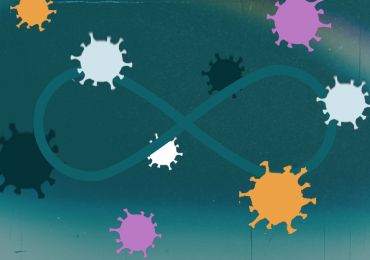By Chaia Heller
[Note: This commentary by ISE faculty member Chaia Heller was originally published on ZNetwork. The views expressed here are her own and the text was not reviewed by the ISE’s board or faculty prior to publication.]
I’m not a scholar of the history or politics of Palestine or Israel. But I’m Jewish, queer, a mother, a feminist, and a leftist who mourns this tragic moment in history. I’m a leftist fearful and grieving for Palestinians, Israelis, non-Israeli Jews, and Muslims across this tattered world. If I’m sure of anything, it’s that this moment will forever remain a dark stain on the already blood-soaked fabric of human history.
One of a series of paintings by Chaia Heller on the theme of war.
As I write these pages, Palestinians face an existential war as the Israeli government attempts to eradicate Hamas. My decision to write about the left’s relationship with authoritarianism and anti-Jewish racism comes not from a cynical or relativizing ‘whataboutism’ that suggests the issues I raise here are more worthy of the left’s critical attention. The left is providing a requisite and robust focus on mass Palestinian deaths, casualties, and complex historical realities. My purpose in what follows is to address two problems emerging in tandem amidst the current war: A left challenged to present a principled response to dynamics of authoritarianism and rising anti-Jewish racism. By simultaneously addressing these challenges, we may enrich our historical and current understanding of authoritarian and racist dynamics woven into this disaster in the making.
Authoritarianism and left quietism: Are we on the right side of history?
The authoritarian Israeli government led by Netanyahu is falling into the trap set by Hamas. For two years, Hamas planned, with the assistance of countries like Iran, to utilize overkill tactics including execution-style murder, torture, rape, and dismemberment while publicly celebrating these acts on social media. Hamas’s strategy is working. Humiliated and vengeful, the far-right Israeli government is doing the unthinkable: Obliterating Gaza’s already fragile infrastructure while decimating the population of Gaza, half of whom are children.
The left and progressives around the world call for the Israeli government to stop the invasion of Gaza, immediately allow in humanitarian aid, and to end the occupation of Gaza and the West Bank. Leftists also call to stop Jewish religious zealots unjustly settled in the West Bank who are terrorizing and murdering Palestinians.
Yet the left has no call to Hamas.
Many on the left wonder why their comrades support or remain silent about Hamas’ role in this disaster. For the last 15 years, the authoritarian Hamas government in Gaza has been marked by acts of corruption that include the diversion of funds for Gazan aid toward military efforts that made this war possible. And while Hamas governs Palestinians in Gaza, its leadership doesn’t prioritize the safety of its citizens serving as human shields against Israeli attacks.
When the left supports or turns a blind eye to Hamas, we have to ask ourselves a question: Are we on the right side of history?
To grasp the logic shaping this war, it’s key to consider the logic of authoritarianism. As political philosopher Murray Bookchin explains, authoritarianism deploys an instrumental, means-to-ends logic wherein unethical means are justified by desired ends[1]. If Hamas uses military means that leads to the mass deaths of Israeli and Gazan civilians to achieve their ends, then so be it. The same instrumental logic goes for the Israeli government: If the Israeli government takes the life of every single Gazan? So be it again.
The left’s silence or support for Hamas means support for the movement to establish an authoritarian and patriarchal ethno-state with fundamentalist Islam governing Palestinians in a political culture that brutally disciplines women and LGBTQ+ people while thwarting any hope for democracy.
Support for Hamas represents a break in a logic of anti-authoritarianism that has marked the left in recent decades. Increasingly, the left has generated a good deal of optimism from liberation struggles that embody libertarian socialist ideals such as autonomy, solidarity, sex/gender equality, non-hierarchy, social justice, and ecology. The Zapatista freedom movement in Chiapas, Mexico, for example, has uplifted the left by promoting values of democracy, gender equality, and cultural autonomy for indigenous peoples[2]. The Kurdish freedom movement based in Rojava, or northern Syria, has also captured the left’s imagination by promoting anti-statism/anti-nationalism, democracy, ecology, and feminism while working for a secular and ethnically inclusive society[3]. Revolutionary Kurds choose militarism only in self-defense as they protect their communities from the Syrian government, Turkey, ISIS or other invading forces. This left pivot away from ‘tankie’ strategies of terror and irrational violence flags another step forward for a left striving to align ends with means.
In the US, Black scholars and leaders including Modibo Kadalie, Lorenzo Kom’boa Ervin[4], Kali Akuno[5], and Ashanti Alston[6] also signal a definitive break with an authoritarian left that promoted nationalist and hierarchical forms of organization and movement building. Many Black anti-authoritarian leaders embrace a crucial political legacy that includes the Black Panther Party and Black Power movements that spanned from the mid-1960s to the early 1980s.
Yet they describe a political evolution that moved beyond authoritarian and patriarchal features of these movements that led to a different kind of Black freedom movement based on principles of non-hierarchy, solidarity, antiracism, feminism, abolition, and a solidarity economy. Kadalie’s call for a Pan African Social Ecology[7] is a reach for an entirely new paradigm where solidarity among Black communities across the continents transcends a vision where nationalism was the only unifying path forward.
What’s striking about this anti-authoritarian leftist turn generally is an explicit critique of, and critical engagement with, Marxist-Leninist frameworks marked by an authoritarian and instrumental logic of means/ends. Increasingly, the most evocative and dynamic left leaders reject statist solutions in favor of a non-authoritarian future that opens a way for a utopian politics. The Zapatista’s assertion that “another world is possible” continues to inspire millions on the left who also seek a future free of cis-heteropatriarchy, state power, capitalism, as well as religious or ethnic hatred.
And yet here we are, facing a devastating war between the state of Israel and Hamas. And yet, again, the left’s message ranges from apologetic and unprincipled to quietist. If before October 7th, the left was drawn to the path taken by the Zapatistas and Kurdish revolutionaries, then, clearly, we’ve lost our way.
Calls to “Free Palestine” or “End the Occupation,” fail to note that this war is not unfolding in a vacuum where the Israeli government is the sole actor driving this humanitarian disaster. The left must call for an end of the far right Israeli government, Hamas, and other religious fundamentalist authoritarian movements so that peace and democracy-seeking Palestinians and Israelis can get down to the long and hard work of building a viable, flourishing, and possible future for both peoples.
The left needs to recapture its commitment to ethical rather than instrumental reason grounded in a shared set of libertarian socialist principles; When we stand accountable to anti-authoritarian principles, we can see that we can’t cherry pick particular features of authoritarian institutions we’re inclined to criticize while remaining silent about others.
A stunning instance of left instrumentalism surfaced when Russell Rickford, a progressive professor of history at Cornell University was so emotionally overcome with news of the Hamas massacre, he lost his ethical mooring. In a speech to students, Rickford shared that despite his general abhorrence for targeting civilians, he was “exhilarated” by Hamas’s actions that allowed him to finally “breathe.” Rickford suggested that anyone who didn’t share his exhilaration in Hamas’ brutal violence, “would not be human”[8].
Unless the left is to become unmoored from a shared humanity, we can’t be exhilarated by Hamas’s rape, torture, and dismemberment of civilian children, youth, and the elderly while also “abhorring” the targeting of civilians. When we qualify our support for the egregious actions of authoritarian movements like Hamas or Hezbollah, we tarnish the ideals held by Zapatistas, Kurdish, and Black revolutionaries we fervently admire.
By failing to speak out against the inhumane targeting of civilians, the left implies a condescendingly bleak vision of Palestine’s future. As leftists, we need to ask ourselves whether we see Palestinians as incapable of creating movements for democracy and social justice? Do we believe—for ‘cultural reasons’—that Palestinian’s only recourse is to be led by an authoritarian movement that commits rapacious massacres of civilians while disciplining its own people with a fundamentalist religious government that controls women’s bodies and sexuality, while making the lives of queer people unviable? Leftists weighing in on this war show disrespect to Palestinian leftists when we fail to recognize Palestinian’s challenge in fending off authoritarian forces that sabotage and even criminalize their struggle for freedom.
By emphasizing elements of ‘immoral equivalence’ at play in this war between Israel and Hamas, I do not suggest an equivalence of power. I do suggest, however, that leftist critiques fail when we focus mainly on powerful governments while demonizing the people—civilians—governed by those institutions. I also believe that left critiques fail when we romanticizing sets of people or nations who lead or are governed by the powerless.
When we assume a humanitarian perspective, we hold everyone, from the most to the least powerful, to anti-authoritarian principles. The left must transcend a history of romanticizing the oppressed and powerless, seeing suffering as a sign of morality. Suffering is not a virtue: It’s a sign of an ethically wronged humanity and a cause for empathy, compassion, and principled humanitarian action that supports people in their struggle to be free of suffering. Virtue lies not in oppression or powerlessness. It lies in our set of shared ideals as well as a liberatory vision that embodies those ideals.
If we have learned anything from the tragic history of Palestine/Israel, it’s that persecution and genocide are not redemptive. It is a gross understatement to say that the state of Israel did not become “a light unto all nations.” In turn, Hamas, as representative of the oppressed Palestinian people, is no exemplar of left ideals. By ceasing to romanticize the oppressed, we can better avoid the trap of deeming as ‘friend’ virtually any enemy of our enemy, no matter how unprincipled they may be. The authoritarian enemy of our authoritarian enemy simply furthers the irrational logic of inhumanity we seek to transcend.
When we overturn the dustbin of history, out pours a sooty stream of ash. Dehumanization doesn’t often lead to freedom and justice. Dehumanization tends to lead to more dehumanization if and when axes of power are inversed. And when we take the broad view of history, we see that power dynamics can change on a dime. This is precisely why the left needs a clear set of ethical principles that grounds how we think and respond to authoritarianism in any humanitarian crisis. We must be ready to address unanticipated changes that open the way forward for possible emancipatory futures.
Leftists must also remember that institutions are more powerful than the individuals who comprise them. The logic of authoritarian structures like the State is far more commanding than the individuals who comprise any state, no matter how democratic or exemplary the members of that democratic state profess to be. This is true in the case of representative democracies such as the US, Italy, Hungary, or Israel—nations that may be on their way to becoming explicitly anti-democratic regimes.
If the Zapatistas, Rojavan Kurds, or Black anti-authoritarian leaders were offered a state of their own, they would rightly refuse it on principle. These movements are much needed examples of what the left can be, and how far the non-authoritarian left has come. Zapatistas and Kurds who push back daily against the State understand that the State—and authoritarianism generally—have a way of “becoming us” as individuals embody the authoritarian features of the institutions that govern them.
We shouldn’t be surprised when a beleaguered people doled out their own state begin to behave like a state. This is true in the case of Israel (Holocaust refugees fleeing to the British protectorate of Palestine) as well in the case of many nations liberated from colonial rule throughout Africa, Asia, or Latin America. Oppressed people tend to overthrow despotic colonial states only to create new despotic states built from the authoritarian logic of the states that preceded them.
For the left to abide by an ethical logic amidst the murderous chaos unfolding before us, we must explicitly extend an anti-authoritarian critique to every organization, institution, and nation-state driving this catastrophe. Just as we must prefigure the good society to come in our words and actions, we must critique the political formations that disfigure humanity, unleashing indescribable human suffering. Otherwise, we show disrespect to a left legacy that spans from the Paris Commune and the Spanish Civil War all the way to the Zapatista, Kurdish, and Black revolutionaries to whom we look to today for inspiration and a sense of hope.
Toward a fully antiracist Left: Addressing anti-Jewish racism
Photo credit: Getty Images, c/o npr.org.
To regain its morale, the left has another task: To become a fully antiracist movement by addressing anti-Jewish racism. As I noted earlier, this assertion may seem ill timed as Palestinians face an existential war. When the Israeli government is committing unspeakable acts of inhumanity against Palestinian civilians in Gaza and when Palestinians in the West Bank are being terrorized by Jewish religious fanatics, how could it be fitting to discuss Jews as a racist target? Why speak of anti-Jewish racism at all?
Because the left can be infused with a logic of ‘both/and’, called upon by Israeli-American Rabbi Amichai Lau-Lavie [9]. There is no false dilemma between showing grace towards Palestinians or Jews. I believe that we can stretch our hearts mightily to show compassion towards both peoples—even if, in this very moment, Palestine is facing a genocidal war. Even at unspeakably painful times as these, we must retain our humanity: An expansive humanitarianism allows us to hold the vulnerability of the Palestinian people and that of Jewish people, both within and outside of Israel. Though fraught and difficult, I believe that holding a both/and perspective is crucial for a left striving to undo all forms of racism while engaging an internationalist principle of a radically inclusive humanism.
As also noted earlier, as the left is effectively shining a crucial light on the unfolding Palestinian tragedy, there in a space in which to, at least briefly, home in on anti-Jewish racism that is also spiking in this moment. In offering what follows, I do not compare the suffering of Jews in Israel to the suffering of Palestinians. Again, I’m saying the left can hold both/and. Through an expansive logic of both/and, we can explore three reasons (out of many) why the left may include anti-Jewish racism in its anti-authoritarian and antiracist vision at this historical juncture. First, we must consider that religious hatred and anti-Jewish racism is what brought us here, causing Jewish Holocaust refugees to flee to Palestine/Israel.
Second, we must grasp that many Jews across the world still see Israel/Palestine as the only place of refuge should anti-Jewish racism make life untenable in the countries in which they live. Third, it’s key to note that Jews and Muslims around the world are currently being targeted by racism as a result of this war; It’s a painful truth that the rise in anti-Jewish racism fortifies Netanyahu’s commitment to continue this vengeful mission to root out Hamas, killing thousands of Palestinians in the process.
How do we address anti-Jewish racism in this moment? We can think beyond the truism that rightly posits that criticism of Zionism or Israel isn’t inherently antisemitic or racist. We may take this assertion further by heeding the words of Ibram X Kendi who teaches that “not being racist” doesn’t make us actively antiracist[10]. It’s insufficient to state that one isn’t antisemitic or isn’t antiJewish racist—for critiquing Israel or for whatever reason. We need to articulate what active antiracist solidarity with Jews looks like on the left.
To overcome a centuries-long history of left anti-Jewish racism, we may consider three more objectives that include 1) understanding Jewish history, 2) confronting and dispelling racist myths that dehumanize Jewish people, and 3) showing solidarity and compassion for Jewish comrades both within and outside of Israel.
I use the term anti-Jewish racism because ‘anti-Semite’ is the product of a racist linguistic intervention made in 1862 by German pundit Wilhelm Marr, who racialized European Jews as Semites to establish them as non-European. Marr’s pro-German, “League of Anti-Semites,” introduced ‘anti-Semite’ into popular parlance while creating the first popular movement organized solely around Jew hate. Social scientists and others (including Jews) adopted Marr’s term which led all Jews and people of Middle Eastern descent to see themselves as fictive Semites (ironically leading non-Jews to see themselves as victims of antisemitism!). If we successfully retired fictive racist terms like Aryan, Negroid, and Mongoloid, in the 20th century, in the 21st, we can retire ‘Semite’. ‘Anti-Negroidism’, ‘anti-Mongoloidism’, or ‘anti-Semitism’ are unacceptable racist terms for anti-Black racism, anti-Asian racism, or anti-Jewish racism. ‘Anti-Semitism’ (even if you spell it ‘antisemitism’) is thus, no longer an accurate, antiracist, or acceptable way to talk about Jew hate[11].
Understanding Jewish history
Learning about Jewish histories is key to understanding anti-Jewish racism. In so doing, we may learn about Jewish histories preceding the current and historically unprecedented seventy-five-year window of relative inclusion for Jews in the US, Palestine/Israel, and in other countries across the world that have grown more tolerant of Jews[12]. In the US, this 75-year window (called, “Jewish American exceptionalism”) began after the close of the Holocaust, becoming increasingly ‘open’ in the 1960s as Jews of European descent acquired, for better or for worse, status as provisional white people in the US[13].
To understand, however centuries of Jewish hardship and subjugation, we need to take a long view of Jewish history. When we look before this ‘exceptionalist era’ we see Jewish history as riddled with periods of cyclical violence and subjugation. A long view allows leftists to better understand what many Jews fear: A window of safety and inclusion that is anomalous, fragile, and entirely capable of shattering. History reminds Jews that this window can and will implode if political anti-Jewish racism regains ascendancy.
Understanding Jewish history means grasping the pre-Christian, Christian, and Islamic features of anti-Jewish religious hatred in the pre-modern period that are still active today. It means also comprehending modern forms of racialized European Jew hate that emerged in the 19th century when anti-Jewish pseudoscientists determined Jews a distinct and inferior racial type. Less than a century later, Hitler used the ‘racialized Jew’ to justify a Nazi program that incinerated 2/3rds of European Jews determined racially “impure”[14].
The history of Middle Eastern and North African Jews is also central to understanding anti-Jewish racism. The history of Sephardic and Mizrahi Jews is varied and cyclical, marked by periods of relative tolerance also followed by periods of exclusion and violence. The exodus of both groups of Jews to Palestine/Israel—where they now constitute a majority of Israeli Jews—signals their fragile and fraught status in their previous host countries. Understanding Jewish histories helps the left understand, again, why Ashkenazi people fled to Palestine/Israel. It also sheds light on why Sephardic and Mizrahi Jews fled to Israel/Palestine in the years after the state was established as they faced bigotry and expulsion in their host countries, and thus sought asylum.
Confronting and dispelling racist myths
As we address anti-Jewish racism, we can identify and interrupt racist myths that include a particularly dangerous notion of a timeless and universal Jewish power endowed with nearly superhuman political, financial, and cultural capacities. This myth leads leftists to view Jewish comrades as sharing a financial and political power that makes them invulnerable to racism[15]. This myth also distorts leftists’ understandings of the actual history of capitalism and the geo-political dynamics of state bodies globally. It’s not that religious power is itself mythical: Powerful religions such as Christianity, Islam, and Hinduism have indeed driven statist political agendas for centuries. But there exists no comparable centuries-long “Jewish power.”
In discussing Jews generally, we need a better way to distinguish between Jews and those referred to “non-Jews.” As a brief aside, I’ll explain here why I chose the acronym ‘descendants of religious majorities (Dorm) as a way to refer to people who are not Jewish[16]. First, the prefix ‘non’ invokes a notion of negation and exclusion which is an unideal linguistic intervention for Jews racialized as exclusionary or ‘clannish.’ Second, the term ‘non-Jew’ unmarks subjects the way ‘whiteness’ unmarks descendants of white Europeans. Third, the word ‘majority’ signals the 92% of the global descendant population of major world religions (including atheism) as compared to Jews at .2%. The acronym Dorm, then, removes an exclusionary ‘non’, marks religious descendancy, and notes the stunning ratio between Jews and descendants of majority religions—helping us to see and consider the meaning of descendent-membership in majority religions.
Returning to anti-Jewish racism, it’s not surprising that Jews raised outside of Israel tend to believe myths of Jewish power as they share the same culture as their Dorm comrades. As a result, Jews often find themselves pitted against each other as left groups debate whether to address, downplay, or ignore instances of anti-Jewish racism that inevitably arise in left spaces. Jews who see themselves as invulnerable to racism (or believe that minimizing it protects Jews) are often reluctant to address instances of anti-Jewish racism. Other Jews may be aware of being directly impacted by anti-Jewish racism or understand it as a leftist issue. These individuals may speak out against instances of left anti-Jewish racism only to find themselves assailed by leftists that include left Jewish comrades.
How are myths of Jewish power relevant to the current calamity of this war? Myths of Jews wielding great politically, financial, and cultural power foreclose on the left’s ability to see Jewish vulnerability. If we don’t ‘see’ this myth, we can’t see the cause and effects of Jew-hating racist speech and violence that are, again, mounting as a result of the Israeli government’s actions. Seen as a powerful cabal, Jews are targets for those who hold them responsible for the current war and seek revenge.
Left solidarity and empathy for Jewish comrades
In the current crisis, understanding anti-Jewish racism can build bridges of solidarity and empathy between Jewish and Dorm leftists. As the British comic and writer David Baddiel notes[17], Jews are one of the only ethnic groups regarded as undeserving of the cultural sensitivity afforded to other ethnic minorities.
For example, Dorms may be insensitive to how signs reading “Jews Out of Israel!” or “From the river to the sea!” may impact their Jewish comrades protesting beside them. Even if the intent of the original call of “From the river to the sea,” wasn’t a call to exterminate or expel Jews from Palestine/Israel, it may impact those fearing for Jews’ safety within and outside of Israel/Palestine[18]. Left solidarity with Jews asks leftists to pair calls to end the occupation with a commitment to support peace and democracy-seeking Jewish Israelis and Palestinians they see as having the potential to co-create a shared and dignified free society:
Solidarity with Palestinians.
Solidarity with Jewish Israelis.
Both. And.
Left solidarity with Jews also asks us to reconsider questioning Jewish comrades about their position on Palestine/Israel. Such questioning is rightly seen as a microaggression when directed, for example, towards Chinese or Indian Americans asked about their position on policies of the Chinese or Indian governments. As David Baddiel suggests, affording cultural sensitivity to Jews is integral to a leftist ethos of mutual respect.
Being a left Jewish ally also entails critically engaging with comrades who celebrate or qualify the Hamas massacre. Additionally, allyship can mean sharing the grief of Jewish comrades impacted by a horrific event like the October 7 massacre. As few vigils for the victims of October 7th were held across the world by Dorm leftists, Dorm solidarity came primarily and graciously from faith-based organizations in Muslim, Christian, and Buddhist communities—which is a beautiful thing. A left committed to Jewish solidarity will one day soon, hopefully, show the same grace.
Supporting Jewish leftists also means interrupting anti-Jewish racism when it surfaces in university settings[19]. College campuses are historically vital spaces where teachers and students generate rich intellectual cultures and politics. Yet since October 7, many campuses (particularly in the US) have become spaces where some leftists communicate instrumental and careless hate rather than cultivate principled and respectful discussion. Far right groups, including neo-Nazis, are using debates about the war (on and off college campuses) to unite the right and left by weaponizing anti-Jewish racism as a way to speak critically about Palestine/Israel. Again, a more antiracist and principled left can do better.
We can deepen our sensitivity towards Jewish comrades by recognizing the ongoing impact on Jews who endured a 19th century of continuous massacres (pogroms) followed by a Holocaust, followed by yet more pogroms.
The redemptive power of history is that it offers us an opportunity to cultivate empathy with others who have faced unspeakable histories. It is essential for leftists to understand that many Israelis and US Jews today are the children, grandchildren, or great-grandchildren of Holocaust or pogrom survivors—who in turn, are descendants of centuries of Jewish struggle. The left begins to humanize Jews as we cease to confuse a Jewish striving for safety with a striving for power.
Left solidary with Jews also means interrupting accusations that Jews “weaponize” the Holocaust and that they “use” concerns about anti-Jewish racism as a manipulative or cynical cudgel. Such statements trivialize the ripple effect of generational trauma that is very real particularly among Ashkenazi comrades within and outside of Palestine/Israel[20]. A left that empathizes with Jews’ fears of a genocidal history repeating itself may indeed lead one day to a collective leftist call of “Never Again.”
For many decades now, leftists have acknowledged the ongoing impact of centuries of chattel slavery and colonialism on descendants of formerly enslaved Africans and indigenous people globally[21]. An actively antiracist view of history may be also extended to Jewish histories. There is no statute of limitations for generational trauma as time does little to heal wounds. Only by institutionalizing antiracist principles and action, may we begin to heal the wounds of racial hatred for all dehumanized by racism—wounds that are five hundred years in the making.
Left solidarity with Jews also means distinguishing the Israeli people from the right-wing Israeli government. Leftists tend to understand that we can’t hold the US populace responsible for rising white nationalism and Trumpism. We also know that we can’t hold Palestinians in Gaza responsible for the atrocities of Hamas. In the same vein, the left can’t hold the Israeli populace responsible for Israel’s right-wing religious fanatics or for the authoritarianism of the Netanyahu government [22].
The Israeli left has innumerable challenges including growing religiosity among more recently immigrated Jews and a peace process thwarted by extremists in Israel. In Palestine, too, religious authoritarians have worked to impede Palestinians working toward a future of co-existence. Despite these formidable obstacles, there remains a core of committed activists and organizations in Israel and Palestine that keep the hope of peace, inclusion, and democracy alive.
Israeli progressives and leftists need the solidarity of leftists internationally as they fight for a two-state, federal, or confederated society. Ironically or tragically, the Israeli left saw a robust resurgence of pro-peace and pro-democracy activism in the months leading up to October 7. Hundreds of thousands of Israelis protested daily against the Israeli right with the objective of removing Netanyahu from office[23]. If we haven’t heard of these movements, it’s because the right-wing Israeli press (and sadly the left) media generally report little on these movements.
Leftists around the world were surprised to learn that among the Jews slaughtered or kidnapped from Kibbutz Be’eri are leftists who have fought for Palestinian rights and inclusion for decades. Vivian Silver is but one of the 200 hostages taken by Hamas. She is a leader of Women Wage Peace, a large grass-roots movement created after the Gaza War of 2014 working towards a peaceful resolution for Palestine/Israel. Left solidarity with Jews means knowing the names of Israelis like Vivian Silver as well as those of her comrades taken hostage, calling for their safe release.
We can do better by learning about organizations and movements that are political homes to many of the murdered and kidnapped that include less radical organizations such as The Coalition Against Racism in Israel, the Association for Civil Rights in Israel, and Israelis Against Racism. There are also inspiring secular, peace-seeking, feminist, and antiracist organizations with whom the international left may feel more alignment and solidarity that range from Women in Black, Ta’ayush, and the Da’am Workers Party, to Hadash and Breaking the Silence. These organizations may not fully support the stateless vision embraced by many left radicals. But they are a sign that there are people on the ground seeking a different path forward. And as the left generates curiosity about an Israeli left with which we may feel aligned, we will indeed find the individuals, groups, and communities with whom we can open dialogue and relationships of solidarity.
Reclaiming our ethical mooring as leftists means building on the legacies of the Zapatistas, Kurds, and anti-authoritarian Black leaders who hold fast to left ideals. When leftists see Zionism as having been an ideological force that drove European Jewish refugees after the Holocaust to seek asylum in Israel/Palestine, they fail to understand Jewish history. The vast majority of these refugees did not want to go to Israel and would have been grateful to live in the US, Canada, or in Britain – but no country would take them.
Most of these refugees in 1947 hailed not from assimilated western European cities or countries. They were mainly rural shtetl-dwellers (think Fiddler on the Roof) and many were illiterate religious people unfamiliar with the antistatist Zionism of Martin Buber, or with ideological Zionism generally. And even if there was a universe in which these refugees had been exposed to thinkers like Buber, they had no access to living and breathing exemplars of left idealism as we have today among the Zapatistas and revolutionary Kurds that may have opened the way toward federal or confederal formations that transcend a nationalistic framework.
The left has reached a historical moment where another world is indeed possible in Israel/Palestine if the minds, hearts, and imagination of the Palestinian and Israeli people work together, in unison. If the utopian reach of these words seems naïve or engenders cynicism, it may be a sign that we need to reclaim our revolutionary nerve as well as our unapologetically idealist vision. Every revolution, every humanistic endeavor for social and political justice, emerged from a shining cauldron of ideals. These ideals have moored revolutionaries to their principles, buoying them to keep moving the arc of history forward even when facing moments of weariness that are part of the long struggle for freedom.
*
This is a horrific moment to be a Palestinian struggling to survive in Gaza while fearing for the many who will continue to perish during this war. This is a terrifying time for Palestinians in Gaza who are aware of being used as human shields.
This is an appalling time for Jews of conscience living in Israel, witnessing their government commit mass murder while they themselves, also face an existential threat: Powerful nations can indeed, at their whim, determine Israeli Jews as a ‘collateral loss’ should they choose to reconfigure the Middle East into a more expedient geo-political order.
This is also a trying time to be a non-Israeli Jew watching anti-Jewish racism combust across the world, wondering if this is the beginning of yet another period of massive Jewish exclusion, violence, and death. It’s a deeply painful time for all Jewish humanists who grieve Palestinian devastation that is approaching the ‘legal’ international definition of genocide.
The left loses its integrity when we support or remain silent or apologetic regarding authoritarian entities like Hamas that denounce every value the left stands for. We regain our integrity when we hold fast to our principles and compassion for every human being because if the left is anything, it is a dream for humanity rising toward principled freedom. As leftists, we must identify and support members of both the Palestinian and Israeli left who seek a world that reflects our ideals of democracy, social justice, and a culture of ethnic and religious freedom and inclusion.
When we fail to mourn the loss of any human life, we are a left that’s lost its humanity. For leftists to recapture our shared moral compass, we must find and support those who seek anti-authoritarian, fully antiracist, feminist, queer, and truly democratic futures—wherever and in whomever the seeds for such futures lie. We must lift up all freedom seeking people as they build new institutions shaped by a logic of democracy and a radically inclusive humanism that sees that a life is a life, no matter whose body, whose heart, that life is beating in.
Chaia Heller, is a writer, teacher, activist, anthropologist, and artist who has been teaching political and feminist theory at the Institute for Social Ecology for nearly four decades and taught science and technology studies, food politics, and gender studies for nearly a decade at Mount Holyoke College. Chaia has been active in movements ranging from the feminist, ecofeminist, and Left Green movements, to the global justice movement, and Occupy. Chaia is the author of The Ecology of Everyday Life (Black Rose Books) and Food Farms and Solidarity (Duke University Press). When not engaged in teaching and writing about political issues, Chaia is engaged in painting and creative writing.
[1] Murray Bookchin, the primary creator of a body of revolutionary theory called social ecology, drew many insights from the Frankfurt School regarding the place and meaning of reason in the revolutionary tradition. For Bookchin, instrumental or ‘conventional’ reason is suited for everyday problem solving used in computational or practical endeavors related to such realms as engineering. He asserted, though, that ethical reason is necessary for building a foundation of a good society that is accountable to a shared and transparent emancipatory logic of non-hierarchy, direct democracy, social justice, antiracism, feminism, ecology and a moral economy. In the spirit of Gen Z, I advise readers to “Google Murray Bookchin,” or, consult Bookchin’s important volume, The Philosophy of Social Ecology, AK Press, 1996.
For a concise reflection on how progressives often fail to note that Hamas’s objectives as an authoritarian movement contradict most of their political ideals, see Helen Lewis, “The Progressives who Flunked the Hamas Test.” In The Atlantic, October 13, 2023. https://1ft.io/proxy?q=https%3A%2F%2Fwww.theatlantic.com%2Fideas%2Farchive%2F2023%2F10%2Fhamas-pop-intersectionality-leftism-israel%2F675625%2F%3Ffbclid%3DIwAR0sBbaVoQKet9Itgq8OkU0M3y-TrU_f-FzPiK5GXAXyi1i50EG2I7GmHRg
[2] For a concise introduction and overview of the Zapatista movement, see Kurt Hackbarth, “The Zapatista Revolution is not Over,” In, The Nation, September 2019.
[3] There are many beautifully written texts on the Kurdish freedom movement. As I’m particularly moved by the movement’s emphasis on feminism as central to the broader anti-authoritarian revolution, I recommend those interested in the Kurdish women’s movement to see, Dilar Dirik, The Kurdish Women’s Movement: History, Theory, Practice. Pluto Press, 2022.
[4] Kom’boa Ervin’s most recent book, is a particularly insightful discussion of the relationship between Black anarchism and the broader current abolitionist movement to end racist policing and incarceration in the US that targets mainly Black and Brown people. See, Lorenzo Kom’boa Ervin, The Nation on No Map: Black Anarchism and Abolition, AK Press, 2021.
[5] Kali Akuno is a key Black leader, scholar, and founder of a Cooperation Jackson, an anti-authoritarian organization working to create a self-organizing solidarity economy in Jackson, Mississipi. See, Jackson Rising Redux: Lessons on Building the Future in the Present Paperback PM Press, 2023.
[6] Ashanti Alston is an anarchist scholar, activist, and former member of the Black Panther Party and Black Liberation Army. Earlier in his life, he was a political prisoner for over ten years and currently works in the Jericho Movement to free US political prisoners. Alston is the author of Anarchism, Zapatismo & the Black Panthers. AK Press, 2006.
[7] Modibo Kadalie is a long-time scholar and organizer active in the civil rights, Black Power, and Pan African movements. For a look into Kadalie’s engaging discussion of the relationship between direct democracy, ecology, and social liberation, see, Modibo Kadalie, Pan African Social Ecology: Speeches, Conversations, Essays. AK Press, 2019.
[8] See, “Cornell Professor ‘Exhilarated’ by Hamas’s Attack Defends Remark” Cornell Daily Sun October 16, 2023. Also see “Cornell Leaders Condemn Prof. ‘Exhilarated’ by Hamas Attack” Inside Higher Ed October 18, 2023. A longer excerpt from Rickford’s talk reads, “Hamas has shifted the balance of power. Hamas has punctured the illusion of invincibility (…) That’s what they’ve done—you don’t have to be a Hamas supporter to recognize that. And in those first few hours—even as horrific acts were being carried out, many of which we would not learn about until later—there are many Gazans of goodwill, many Palestinians of conscience, who abhor violence, as do you, as do I, who abhor the targeting of civilians, as do you, as do I, who were able to breathe! (…) They were able to breathe! For the first time in years! It was exhilarating, it was exhilarating, it was energizing! And if they weren’t exhilarated by this, this challenge to the monopoly of violence, by this shifting of the balance of power, then they would not be human. I was exhilarated!”
[9] Rabbi Amichai Lau-Lavie is a New York based Israeli-American rabbi, peace activist, and “Storah Teller” who co-founded the dynamic, experimental, queer-positive, ‘god-optional’ and religiously and ethnically inclusive project, LAB/SHUL. To learn more about Rabbi Amichai and LAB/SHUL, see https://www.labshul.org/
In an interview on NPR, rabbi Amichai offers a soulfully articulate discussion of a ‘both/and’ approach to the Israel/Palestine war. See, “What a rabbi hopes to offer the wounded and grieving in Israel during the week after the October 7 massacre.” Interview with Ari Shapiro, National Public Radio, October, 20, 2023. https://www.npr.org/2023/10/20/1207650429/what-a-rabbi-hopes-to-offer-the-wounded-and-grieving-in-israel
[10] Ibram X. Kendi’s groundbreaking book transforms how we think of racism and antiracism, establishing ‘antiracism’ as a verb, rather than a noun. See, Ibram X. Kendi, How to Be an Antiracist. Bodley Head, 2019.
[11] For a more detailed discussion of the shift from ‘antisemitism’ to ‘anti-Jewish racism’, and to learn about an instance of left anti-Jewish racism, see Chaia Heller, “Questioning Öcalan’s Jewish Question,” in Harbinger: A Journal of Social Ecology, Issue 2, 2022, available at https://harbinger-journal.com/issue-2/questioning-ocalans-jewish-question.
[12] A discerning discussion of Jewish exceptionalism is found in Tony Michels, “Is America “Different?” A Critique of American Jewish Exceptionalism.” American Jewish History, Vol. 96, No. 3 (September 2010), pp. 201-224. Johns Hopkins University Press.
[13] Karen Brodkin offers an elaborate discussion of how Ashkenazi Jews became white in the US, see Karen Brodkin, How Jews Became White Folks and what that Says about Race in America. Rutgers University Press.1998.
[14] For an extraordinarily accessible and detailed history of the pseudoscience of racialized typologizing, see Joseph L. Graves and Alan H. Goodman. Racism, Not Race. University of Columbia Press, 2021.
[15] Chaia Heller, Ibid. In 2021, I was one of a group of nine social ecologists who wrote a reflection piece addressing the anti-Jewish tropes contained with Abdullah Öcalan’s, The Sociology of Freedom, published in 2020. As Öcalan is the symbolic leader of a Kurdish Freedom movement politically aligned with social ecology, we were surprised to find pages of 19th century style tropes about Jewish power that Öcalan described as part of a larger “Jewish Ideology.” When our group met with Kurdish leadership and Öcalan scholars to discuss the issue, we were disappointed when they denied that the pages contained anything that could be considered antisemitic. Many in our group wondered if respected leftists are unable or unwilling to address 19th century style anti-Jewish racism (like what is found in the forged tract, The Protocols of Zion), then how will the left ever be able to address other instances of anti-Jewish racism that emerge in discussions of Palestine/Israel and generally. To read our group’s short reflection piece, “Reflections on the Antisemitic Content in Öcalan’s The Sociology of Freedom,” https://social-ecology.org/wp/2021/07/antisemitic-content-in-sociology-of-freedom/ . To view an informative panel on left antisemitism that features several of co-writers (sponsored by the Institute for Social Ecology), see, “Jews Don’t Count and Count Too Often: Reflections on Left Antisemitism, https://www.youtube.com/watch?v=4S__InSgzSE&t=3921s.
[16] Additionally, the Yiddish/Hebrew term “goy” and “gentile” (derived from the term “goy”) mean “those who belong to a ‘nation’”—meaning that class of people consisting of everyone but Jews, who belong to no ‘nation’. Over time, ‘goy’ and ‘gentile’ ceased to reflect Jewish exclusion (from nations/societies) but instead reinforced a stereotype of Jews as clannish and exclusionary. As previously stated, replacing ‘gentile’ with ‘non-Jew’ has the effect of reproducing the racist notion that Jews see those who aren’t Jewish as ‘non-people’. The acronym, then, shifts from a framing of Dorms as a ‘non-Jewish non-people,’ to a framig that is substantive and illustrative. In other words, this acronym suggests what Dorms are—as descendants of religious majorities—rather than what they’re not.
[17] David Baddiel, Jews Don’t Count: How Identity Politics Failed One Particular Identity. London, TSL Books, 2021.
[18] For a discussion of the original intent of this call, see, Maha Nassar, “’From the River to the Sea’ Doesn’t Mean What You Think It Means.” In, The Forward. Dec. 3, 2018, at https://forward.com/opinion/415250/from-the-river-to-the-sea-doesnt-mean-what-you-think-it-means/.
[19] See, Amna Nawaz. “Israel-Hamas war leads to increase of antisemitic threats on college campuses.” PBS Oct 30, 2023 https://www.pbs.org/newshour/show/israel-hamas-war-leads-to-increase-of-antisemitic-threats-on-college-campuses Also see,Tess Owen, “Hijak Pro-Palestine Protests: Neo Nazis are Showing Up at Protests to Push Antisemitic Conspiracy Theories and Tropes in the Mainstream, https://www.vice.com/en/article/k7zx5a/neo-nazis-hijack-pro-palestine-protest-mike-enoch
[20] For a short discussion of Jewish generational trauma tied to the October 7, massacre, see, Dara Horn. “Why Jews Can’t Stop Shaking Right Now,” in The New York Times. Oct. 22, 2023. https://www.nytimes.com/2023/10/22/opinion/hamas-israel-jews-massacre.html
[21] See Maurice Apprey, From the Events of History to a Sense of History: Aspects of Transgenerational Trauma and Brutality in the African-American Experience. Routledge, 2004.
[22] The story of the Israeli left is complex, fraught, and sorrowing, as is the case of the US left and in much of the world today. The Israeli left faces two main challenges in the form of 1) an influx of religious Jews from Russia, Middle Eastern, and North African countries who tend to toward political conservatism, and 2) an unrelenting set of failures among movements for peace between Israel and Palestine repeatedly thwarted by right-wing factions in the Israeli government as well as authoritarian and religious forces that stymy the Palestinian peace movement. For a concise discussion of the Israeli left, see Ian Buruma, “What Became of the Israeli Left?” in, The Guardian. Wed, Oct. 22, 2023. https://www.theguardian.com/world/2003/oct/23/israel
[23] For an overview of the pro-democracy protests against Netanyahu, see Charles Enderlin, “Historic demonstrations against Netanyahu’s judicial reform: Israel’s growing wind of rebellion,” in Le Monde Diplomatique, October, 2023. https://mondediplo.com/2023/10/03israel
The post Authoritarianism, Anti-Jewish racism, and The Israel-Hamas War: An Open letter to the Left appeared first on Institute for Social Ecology.
Leave a comment









